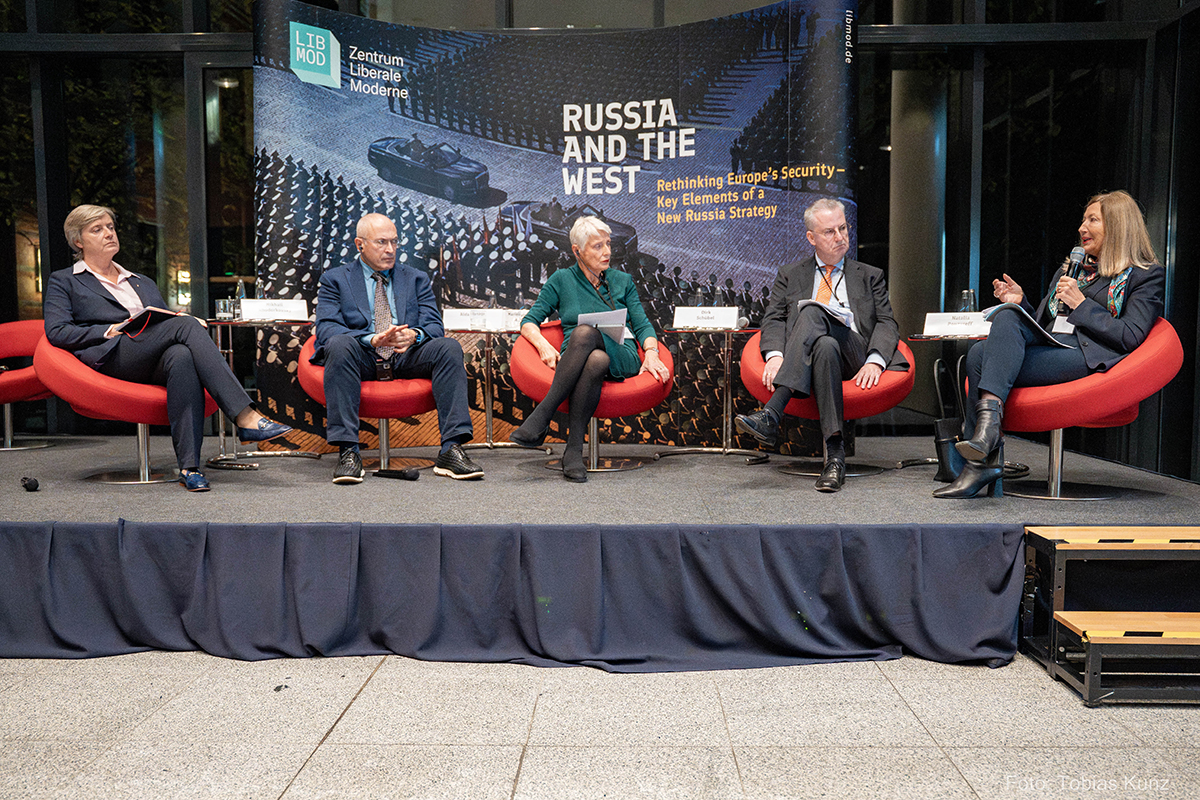China is Learning in Israel how to do Business in Europe

In Israel, Chinese investments are increasingly viewed critically, partly because of China’s relations with Iran. On the other hand, China offers enormous economic opportunities, according to Galia Lavi of the Institute for National Security Studies in Tel Aviv.
The interview was conducted by Till Schmidt for LibMod.
How would you characterize Israeli-Chinese relations?
There are three phases. With the start of official diplomatic relations in 1992, new life was breathed into economic relations in particular. But military relations also came into the picture at that time, but they ended around 2005, when the U.S. vetoed sales of Phalcon radar systems and Harpy drones to China. That was a big issue here in Israel and it took us a lot of time to get back on track with China. Nevertheless, with the establishment of the Export Control Authority in the Ministry of Economy and Industry in 2006, the export of military goods to China stopped.
In 2013, then-Prime Minister Benjamin Netanyahu visited Beijing, ushering in the honeymoon phase of Israel-China relations. It included greater levels of trade, Chinese investment in Israel, tourism and academic cooperation. However, under US President Donald Trump, this phase ended again. The US administration pressured Israel to downgrade relations with China. Netanyahu, however, responded mainly with rhetorical gestures. Nevertheless, Chinese investment in Israeli infrastructure and in the high-tech sector has fallen sharply.
Is this due exclusively to pressure from the USA?
That plays a major role, even under Joe Biden. But there is also the decision by Chinese President Xi Jinping not to make it easy to invest outside China. This is not limited to Israel, however, but is a global trend. In addition, Israel 2020 established a screening mechanism for foreign investment in infrastructure projects. How exactly the committee justifies its decisions, for example whether it is always security concerns that tip the scales, is unclear, because the committee does not publish its justifications. But the numbers make it clear that since the committee began its work, there has been a decline in Chinese investment.
How has U.S. strategy changed since Joe Biden took office?
Trump was the elephant in the room; it remained unclear what exactly was meant by deals that could now no longer be done. Are people still allowed to buy T‑shirts? Dig tunnels and have roads built? And why is the U.S. itself still allowed to do business with China? Biden communicates more clearly and takes a stance that is more aimed at joining forces and sticking together. There is a different atmosphere, a kind of commander’s spirit. Even if there is no corresponding legislation, it is clear what is at stake.
What do Israel and China expect from the joint relationship?
For Israel, China is an enormous economic opportunity. After all, it is the largest market in the world, which Israel cannot simply ignore. China also sees Israel as a political mediator in its relationship with the United States. Thus, Chinese government representatives repeatedly asked Israel to bring the U.S. closer to the Chinese position.
But China is also and above all concerned with economic relations, specifically with gaining experience in Israel. In order to be able to do business in Europe on a large scale, it needs qualified experience in an industrialized country. Representatives of China say this quite clearly, for example Miao Qiang, the CEO of Shangai International Port Group, which now operates the Haifa BayPort. Chinese companies consider Israel small and insignificant enough not to let a possible failure count. Conversely, however, Israel is important enough to include success in the corporate portfolio.
Where do you see the heart of the conflict of interest between Israel and China?
China is known for using its massive economic expansion for political influence. This is a big risk. All companies are linked to the Chinese Communist Party. In addition, the US, Israel’s most important ally, sees cooperation in the high-tech sector as a threat to its own security. But unlike the military sector, no regulation exists here in the form of a law or a screening mechanism. The US is therefore pressuring Israel to establish something similar to CFIUS (Committee on Foreign Investment in the United States). But Israel does not want to regulate its hugely important and innovative high-tech sector.
Are dual-use exports a problem?
Dual-use is, of course, difficult to define. An initially innocent camera may find military use tomorrow. However, there has been a small unit in the Israeli Ministry of Economy for several years to screen for dual-use goods. The unit is small, however, and not well-funded. Meanwhile: The high-tech sector is a good place to observe what I called earlier the Commander’s Spirit: It is clear that for companies doing business with China, the US market is lost. The high-tech companies in particular understand that. So there is a kind of informal screening mechanism.
China also maintains relations with Iran, Israel’s biggest enemy, which denies the Jewish state’s right to exist, supports terrorism, especially in the region, and is working on its own nuclear program. Is this an issue in Israeli-Chinese relations?
For a long time, Israeli governments had hoped that deeper economic relations with China would change Chinese attitudes. One hoped, for example, for more UN support, including on Iran. However, this did not happen, a fact that was finally acknowledged by the Israeli side. In talks, Israeli government representatives and we at the Institute for National Security Studies (INSS) always emphasize that doing business with Iran also involves supporting terror. The Chinese take note of this — but let it bounce off them. They usually make it clear: We simply see things differently, our relations and business with Iran are none of your business. Politics and business are separated here.
Is there any opposition to this, for example in the Knesset or in the Israeli media?
Yes, there is always criticism, especially in the media. For example, Efraim Halevi, former director of the Mossad foreign intelligence service, and the former head of the Shin Bet domestic intelligence service, Nadav Argaman, have published several articles, some of them in English. But it is clear that a severance of relations by Israel would not deter the Chinese from doing further business with Iran. China is simply too powerful. Moreover, not only would enormous economic potential disappear for Israel, but also the possibility of communicating with a China that might at some point be positioned differently. The point is to keep channels of conversation open.
What is the Chinese leadership’s position on Iran’s nuclear program and the renegotiation of the Vienna nuclear agreement, the Joint Comprehensive Plan of Action (JCPoA)?
China is in favor of an agreement and against the U.S. withdrawal from the JCPoA in 2018. However, China is also in a quandary: because on the one hand, it wants to see Iran back in an agreement, and on the other hand, it knows how to use the lack of an agreement politically for its own benefit to portray the U.S. as an irresponsible actor. Overall, the Chinese do not regard the JCPoA as a perfect agreement, but at least as a basis for further talks. After a new agreement, Israel’s security concerns could then be negotiated, so the credo goes. But this shows how little the Chinese have understood about the threat posed to Israel by the Iranian regime in general and its nuclear program in particular!
Do human rights issues in China — such as the oppression of the Uyghurs in Xinjang province or the conflicts over Taiwan and Hong Kong — play a role in diplomatic relations between Israel and China?
This has not really been addressed by Israeli governments. After all, Israel itself is often criticized on human rights issues, so governments don’t see themselves in a position to lecture others. There have been minor exceptions, such as in the course of the Israeli military operation “Guardian of the Walls” in May 2021 (against the terrorist organizations Hamas and Islamic Jihad in Gaza, editor’s note). At the time, China was stirring things up against Israel in the UN Security Council, using it as a scapegoat in the conflict with the United States. Israel, in turn, responded by supporting Canada’s attempt at the UN to have independent observers investigate the human rights situation in Xinjang.
The oppression of the Uyghurs is a recurring theme in the European media. In addition, eye-witness reports by camp survivors who have fled have appeared regularly in the major publishing houses. Is there anything comparable in the Israeli media?
There are only a few publications on this topic, and when there are, they are mostly in foreign and English-language media. It’s sad but true: Here in Israel we are so busy with our own problems that we don’t look at countries on the other side of the world. Asked about the biggest threat, most Israelis would answer: Iran, Syria or Lebanon. China is very far away for us.
What is the prevailing image of China in Israel?
The general public hardly knew anything about China until Netanyahu’s trip to Beijing. That has changed significantly in the meantime. More Chinese are now coming to Israel, and there is a lot in the local newspapers about Chinese investments, such as at the port in Haifa. Some Israelis are impressed by the way China has built two hospitals for Covid patients in Wuhan within a few days. Others criticize the dictatorial form of government or the oppression of the Uyghurs. Surveys, however, are few and far between, and in any case not detailed. For example, a Pew survey found that in 2019, 70 percent of Israelis thought positively of China; in 2022, that figure was down to 48 percent.
And vice versa: What do Chinese think about Israel?
There don’t seem to be any polls here. But what I do know is that in the general public, Israelis are often stereotypically seen as “smart” and Israel as a “good country.” I’m always surprised that the Chinese have even heard of our small, insignificant country (laughs).
Galia Lavi is a China expert at the Institute for National Security Studies at Tel Aviv University. Her research focuses on Israeli-Chinese relations, particularly in the areas of infrastructure and China’s foreign policy.
![]()
Did you like thike this article? If yes, you can support the independent editorial work and journalism of LibMod via a simple donation tool.
Donate via PayPal
![]()
We are recognized as a non-profit organization, accordingly donations are tax deductible. For a donation receipt (necessary for an amount over 200 EUR), please send your address data to finanzen@libmod.de
Related topics
Newsletter bestellen
Stay tuned with our regular newsletter about all our relevant subjects.





